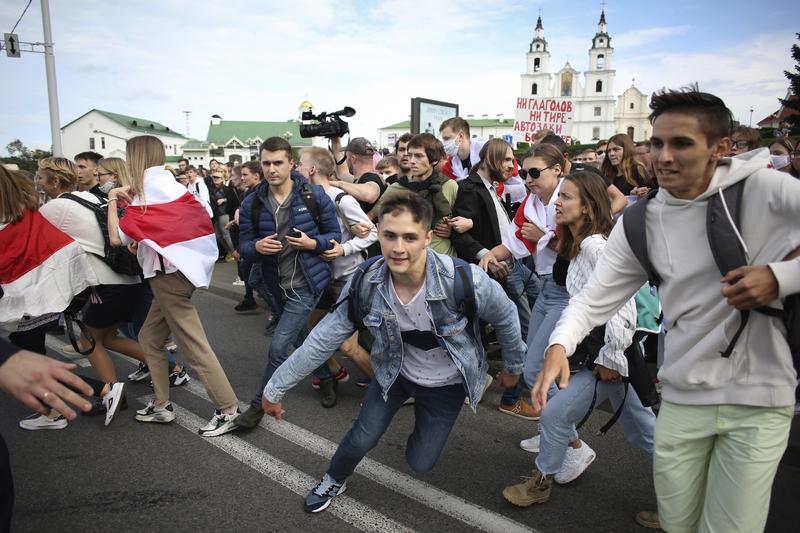 Students run away from police during a protest in Minsk, Belarus, Sept 1, 2020. Several hundred students on Tuesday gathered in Minsk and marched through the city center, demanding the resignation of the country's authoritarian leader after an election the opposition denounced as rigged. Many have been detained as police moved to break up the crowds. (TUT.BY VIA AP)
Students run away from police during a protest in Minsk, Belarus, Sept 1, 2020. Several hundred students on Tuesday gathered in Minsk and marched through the city center, demanding the resignation of the country's authoritarian leader after an election the opposition denounced as rigged. Many have been detained as police moved to break up the crowds. (TUT.BY VIA AP)
Thousands of students boycotted the start of the school year in Belarus on Tuesday and signs of a possible rift appeared in an opposition alliance that has led weeks of rallies and protests against veteran President Alexander Lukashenko.
Lukashenko faces the biggest challenge of his 26-year rule since claiming victory in an election last month that opponents say was rigged. Lukashenko denies electoral fraud and shows no sign of backing down despite the threat of Western sanctions.
Lukashenko’s main challenger, Sviatlana Tsikhanouskaya, issued a statement criticising the strategy of another opposition group with which she formed an alliance during the election campaign
The United States is considering sanctions on seven individuals it says were involved in falsifying the election and in violence against protesters, a senior US State Department official told Reuters.
“It is a minimal effort to ... not just name and shame but to show that when people both steal elections and commit violence against peaceful protesters exercising fundamental freedoms of assembly and speech that there needs to be some accountability,” the official said.
In a rare public reproach, Lukashenko’s main challenger, Sviatlana Tsikhanouskaya, issued a statement criticising the strategy of another opposition group with which she formed an alliance during the election campaign.
Tsikhanouskaya fled into exile two days after the Aug. 9 election. From her new base in Lithuania, she declared herself the rightful winner and launched an opposition council with the stated aim of ensuring a peaceful transfer of power.
Tsikhanouskaya said the council “should not be dominated by any political party”, after opposition leader Maria Kolesnikova and the team of jailed presidential candidate Viktor Babariko announced the creation of a party called ‘Together’.
The declared aim of Babariko and Kolesnikova’s camp to enact constitutional reform was a distraction from the goal of removing Lukashenko and holding new elections, Tsikhanouskaya said.
Kolesnikova’s camp later said it did not wish to disrupt the council’s work, and that it backed Tsikhanouskaya’s call for new elections and her electoral programme.
“Not a single Belarusian doubts Sviatlana Tsikhanouskaya’s victory, and that her victory was stolen,” it said.
‘EVENTFUL SUMMER IS OVER’
Many state-run schools were used as polling stations and teachers helped count ballots in the election, which the election commission said Lukashenko won with an 80 percent vote share.
ALSO READ: Baltic states to hit Belarus' president and officials with sanctions
Answering a call from Tsikhanouskaya, students waving opposition flags staged marches and collected signatures outside several colleges in Minsk calling for Lukashenko to step down.
Video footage showed students, some wearing rucksacks, being dragged away from a crowd and detained by masked security forces. Police also detained seven journalists covering the protests for what the government said were document checks.
There were also new protests at two of the large industrial plants that underpin Lukashenko’s Soviet-style economic model, the Minsk Wheel Tractor Plant and the Minsk Tractor Works, local media reported. Workers at the Belarus Hi-Tech Park on the outskirts of the capital also protested.
Thousands of people were detained after the election and United Nations human rights investigators said on Tuesday they had received reports of hundreds of cases of torture, beatings and mistreatment.
The government has denied abusing detainees.
Lukashenko sought to draw a line under the protests as he visited a vocational training college.
“The president emphasized that the eventful summer is over,” the official Belta news agency said.
Lukashenko has described the protesters as “rats” backed from abroad. On Monday, a third member of the opposition council was detained.
READ MORE: Putin: Russia has set up force to aid Belarus leader if needed
Lithuania, Latvia and Estonia has imposed travel bans on Lukashenko and 29 other officials. The European Union has been working on a list of individuals to target with sanctions but is expected to exclude Lukashenko.
Belarus is Russia’s closest ally among former Soviet states, and its territory is integral to Moscow’s European defence strategy.
Russia has signalled its willingness to prop up Lukashenko’s government and the two countries are discussing the refinancing of Belarusian debt, Interfax news agency reported.


